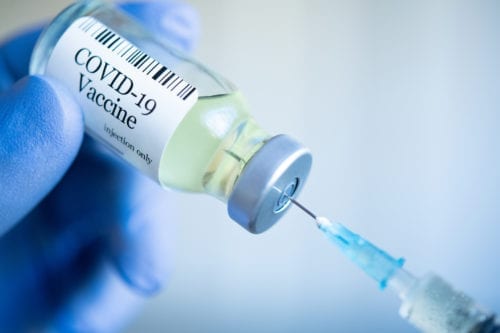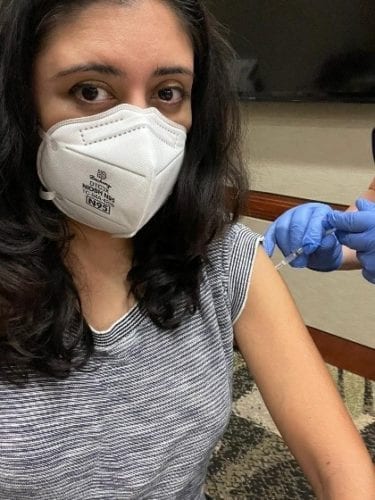
While the vaccine has shown success in preventing COVID-19, it will take a great deal of time before we have enough people vaccinated for life to return to “normal.” For that reason, healthcare providers emphasize that we must all continue with COVID-19 safety precautions – even if we have been vaccinated. Wear a mask any time you are out in public. Stay six feet from others and continue practicing social distancing. Avoid large indoor crowds. Wash your hands frequently and stay home if you’re sick.
In the meantime, here’s what you should know about the various COVID-19 vaccines on the market.
Overview of the different COVID-19 vaccines
Currently, there are two emergency-approved vaccines being distributed and administered throughout the U.S. The Pfizer and Moderna vaccines share many similarities, including key ingredients, efficacy, success-rate, and dosage. Either will offer additional protection against the coronavirus. Additionally, neither vaccine alters or changes DNA.
Both vaccines require two doses to reach their full effectiveness. They each caution against similar side effects including swelling or irritation at the injection site, chills, fever, stiffness, fatigue, headache, nausea and muscle pain.
One key difference between the two vaccines is that the Pfizer vaccine (95% efficacy rate after both doses) must be administered 21 days after the initial dose, whereas the Moderna vaccine (94.1% efficacy rate after both doses) must be administered 28 days after the initial dose.
Who will get the vaccine first?
Certain states have different priorities for who will get the vaccine first. In Florida, three groups have thus far been able to schedule an appointment for a vaccine:
- Health care workers
- Long-term care employees
- Florida residents ages 65 and up
These groups are considered to be at a higher risk for exposure to the virus, or at risk of more serious side effects, should they contract COVID-19. As these high-risk and essential groups get vaccinated, appointments will become available to other segments of the population.
As of early January, around 440,000 individuals have received the first dose of either the Pfizer or Moderna vaccines. Governor DeSantos reports that all 67 Florida counties have received vaccines to distribute to local health departments, hospitals, and health clinics. These institutions are now in the process of scheduling appointments and administering vaccines to these first three groups. Some Publix pharmacies in the state are also providing the vaccines.
When will the general public (nonessential workers and at-risk groups) get the vaccine?
Your job, medical history, and age, determine when you will be eligible to receive the COVID-19 vaccine. As states receive more doses, they can open up availability to front-line workers, including grocery store employees, teachers, civil servants, among others.
In regards to the coronavirus, the general public is considered non-front line, low-risk individuals if they are under 65. While there is not a set date for the general public to begin receiving vaccines, it is speculated that by the end of spring, vaccine availability should be open to all.
How is the vaccine administered?
Both the Pfizer and Moderna vaccines are administered in two doses. For the Pfizer-BioNTech vaccine, individuals need to receive two shots, three weeks apart. This vaccine does not contain latex, eggs, or preservatives and is injected into the middle of the upper arm.
The Moderna vaccine (mRNA-1273) is also administered through two separate doses, 28 days apart. Like the Pfizer vaccine, it’s administered in the same location and doesn’t contain common allergens such as latex, eggs, and preservatives.
Where will the vaccines be administered?

UCF has been approved as a vaccination site for faculty, staff and students, and began with an initial distribution of 1,000 doses of the vaccine the week of January 11 for UCF healthcare workers, faculty, staff and students 65 years of age or older and family members of those individuals who are 65 and older.
Details on how to schedule a vaccination appointment have already been shared with those who are eligible. Further communication will be sent when and if Florida’s executive order expands to allow the vaccine to be given to others.
You may also find vaccination sites located throughout each county. These include health centers, hospitals, and pop-up locations run by the county’s health department. Publix supermarkets are test running vaccine distribution at select pharmacies and may become a large, state-wide provider pending success of its program.
As more and more places receive the vaccine, it’s wise to remain up to date with what your county is rolling out in terms of vaccination so you can prepare a plan ahead of time. Orange County currently has an appointment portal, listing locations, and available appointments, and many other counties have done the same.
Planning to Receive the Vaccine
Because of the changing information related to the COVID-19 vaccine, it’s advisable to have a plan in place when it becomes your turn to receive the vaccine. First, determine which locations are most convenient and accessible to you. Read up on their rules, regulations, and scheduling procedures.
Next, notify your employer about your intention to get the vaccine. Many health departments advise individuals to take the next day off of work in case COVID-like symptoms arise. You’ll also need time off to receive the second dose.
When scheduling a COVID vaccination appointment, you will most likely not have to pay upfront. Reports of scammers taking advantage of the vaccination roll out have begun circulating, as some hackers are creating paywalls on scheduling apps to steal credit card information. Do not give your information away over the phone or online to any unverified sources.
Safety Concerns and Myths around the Vaccine
According to the CDC, no serious health and safety concerns have been reported related to either vaccine. As with any medication, those seeking the vaccination should consult with their healthcare provider first.
While the vaccine did receive approval quicker than other vaccines in medical history, no steps were skipped to receive approval. Technology, collaboration, and scientific advancements helped spur vaccine trials along, leading to quicker, more efficient clinical trials and manufacturing.
Myth: The vaccine gives people COVID-19
Similar to the flu vaccines that are released yearly, both COVID-19 vaccines do not actually contain the live virus. Each distributes genetic material known as mRNA into the bloodstream. This mRNA instructs your cells to create a piece of the protein present on the COVID-19 virus cells. This creation prompts your immune system to respond, then record that response so that when your body does come into contact with the COVID-19 virus, it will already know how to attack and eliminate it.
Myth: The vaccine will change my DNA
The vaccine will not change an individual’s DNA. The messenger RNA is made from DNA but it does not interact with our DNA in a way that permanently alters who we are.
Myth: We don’t know what the vaccine contains
Both Pfizer and Moderna have published their ingredients lists.
Developing Immunity After Receiving the Vaccine
The CDC reports that it may take a few weeks after receiving the vaccine to build an immunity to it, therefore, it’s advisable that individuals remain committed to social distancing and mask guidelines even after receiving the vaccine.
Scientists and researchers are not certain about the longevity of the COVID-19 vaccine because there simply hasn’t been enough time to gauge its lifespan. Since the body’s natural antibodies can last up to a year, it’s presumed that the vaccine could have at least that lifespan and then some.
Similar to other vaccines, the COVID-19 vaccine isn’t 100% effective and Individuals need to continue wearing masks after receiving it. Experts recommend that until a large majority of the population is vaccinated, the virus can still spread quickly and effectively.
In Summary
It’s crucial for all of the population who can get the vaccine to receive the vaccine. Herd immunity can be achieved safely only if a large majority of the population becomes immune. As more and more people get the vaccine, businesses can begin to reopen, restaurants can serve patrons indoors, and we can begin down the path to a normal life once again.
